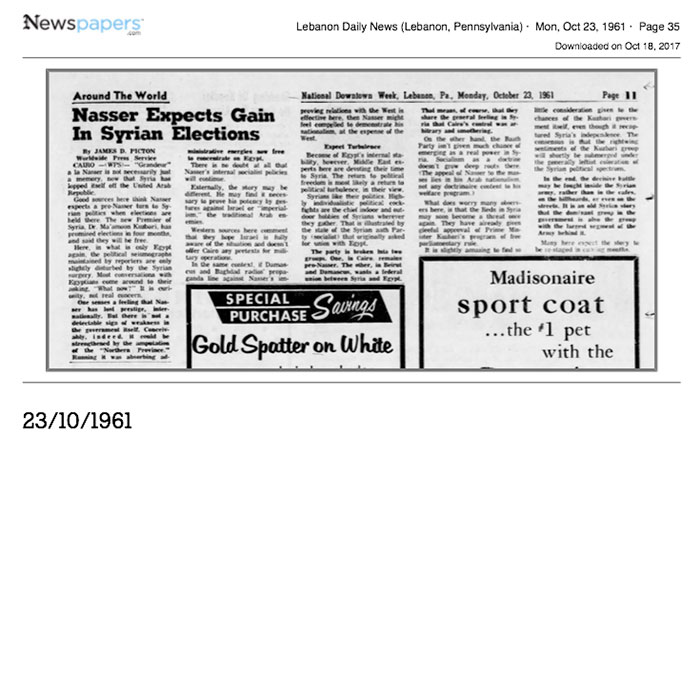Nasser Expects Gain In Syrian Elections - 23/10/1961
Lebanon Daily News (Lebanon, Pennsylvania) – Mon, Oct 23, 1961 – Page 35
Around The World
Nasser Expects Gain In Syrian Elections
By James D. Piction Worldwide Press Service CAIRO – (WPS)
“Grandeur” a la Nasser is not necessarily just a memory, now that Syria has lopped itself off the United Arab Republic.
Good sources here think Nasser expects a pro-Nasser turn to Syrian politics when elections are held there. The new Premier of Syria, Dr. Maamoun Kuzbari, has promised elections in four months, and said they will be free.
Here, in what is only Egypt again, the political seismographs maintained by reporters are only slightly disturbed by the Syrian surgery. Most conversations with Egyptians come around to their asking. “What now?” it is curiosity, not real concern.
One seems a feeling that Nasser has lost prestige, internationally. But there is not a detectable sign of weakness in the government itself. Conceivably, indeed, it could be strengthened by the amputation of the “Northern Province”. Running it was absorbing administrative energies now free to concentrate on Egypt.
There is no doubt at all that Nasser’s internal socialist policies will continue.
Externally, the story may be different. He may find it necessary to prove his potency by gestures against Israel or “Imperialism”, the traditional Arab enemies.
Western sources here comment that they hope Israel is fully aware of the situation and doesn’t offer Cairo any pretexts for military operations.
In the same context, if Damascus and Baghdad radios propaganda line against Nasser’s
improving relations with the West is effective here, then Nasser might feel compelled to demonstrate his nationalism, at the expense of the West.
Expert Turbulence
Because of the Egypt’s internal stability, however, Middle East experts here are devoting their time to Syria. The return to political freedom is most likely a return to political turbulence. In their view, Syrians like their politics. Highly individualistic political cockfights are the chief indoor and outdoor hobbies of the Syrians wherever they gather. That is illustrated by the state of the Syrian Baath Party (socialist) that originally asked for union with Egypt.
The party is broken into two groups. One, in Cairo, remains pro-Nasser. The other, in Beirut and Damascus, wants a federal union between Syria and Egypt. That means, of course, that they share the general feeling in Syria that Cairo’s control was arbitrary and smothering.
On the other hand, the Baath Party isn’t given much of chance of emerging as a real power in Syria. Socialism as a doctrine doesn’t grow deep roots there. (The appeal of Nasser to the masses lies in his Arab nationalism, not any doctrinaire content to his welfare program).
What does worry many observers here, is that the Reds in Syria may soon become a threat once again. They have already given gleeful approval of Prime Minister Kuzbari’s program of free parliament rule.
It is slightly amazing to find so little consideration given to the chances of the Kuzbari government itself, even though it recaptured Syria’s independence. The consensus is that the right wing sentiments of the Kuzbari group will shortly be submerged under the generally leftist coloration of the Syrian political spectrum.
In the end, the decisive battle may be fought inside the Syrian army, rather than in the cafes, on the billboards, or even on the streets. It is an old Syrian story that the dominant group with the largest segment of the army behind it.
Many here expect the story to be re-staged in coming months.
